The UN Human Rights Council in Geneva should actually be a huge fan of sanctions, or so it would seem. How else is the international community supposed to exert pressure on countries that violate the rights of their citizens?
But this is not the case. A line has prevailed in the Geneva body that rejects economic sanctions if they are not borne by the entire United Nations. These are not legal, it argued.
However, a look at the majority ratios dispels the apparent contradiction. The Asian, African and Latin American states voted against the West in the Council at China’s behest. They do not want to be patronized by US-led coalitions, analyzes Frank Sieren.
Chinese tourists are expected to return to Europe for the fall travel season. So far, they have not been able to live out their desire to travel despite the extensive opening up because, among other things, there has been a lack of affordable flights. But the travel industry already foresees the recovery. A first sign was the record domestic tourism revenues during the May holidays, writes Joern Petring.
In 2014, Germany was still at the top of the Chinese pecking order of international partnerships. In Chinese terminology, there was an “all-around developed strategic partner relationship” between the two countries. Nowadays, Germany has to share the attention of its big partner with many more countries, writes Johnny Erling. Xi Jinping has woven a web of new relationships, constantly devising new partnership tiers.

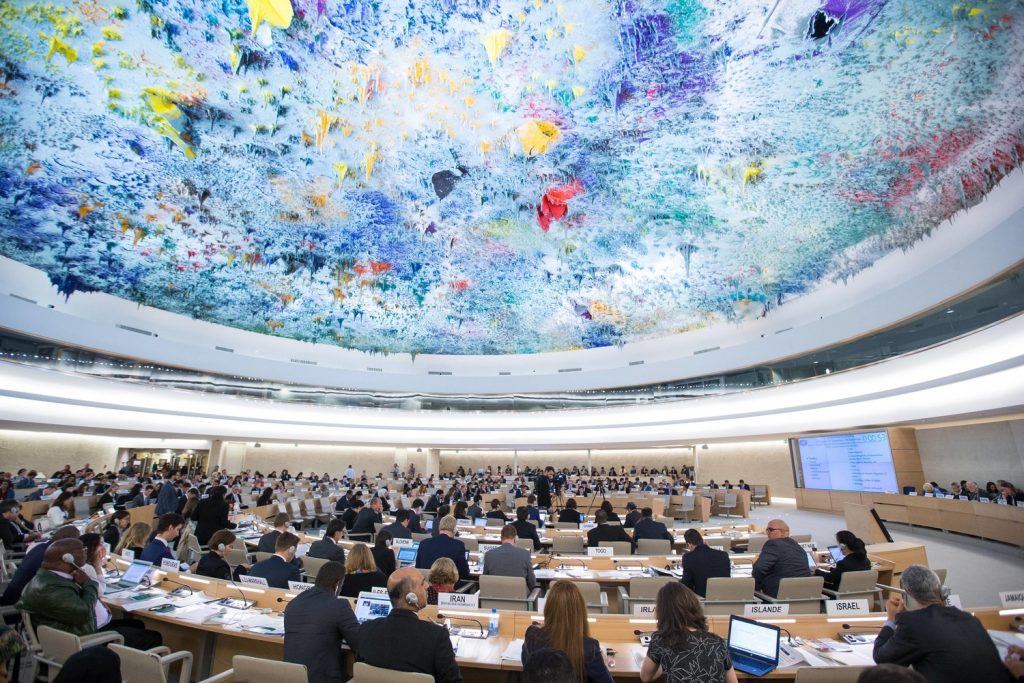
The UN Human Rights Council calls in a resolution for ending unilateral sanctions that are, among other things, “not in accordance with international law, international humanitarian law, [and] the Charter of the United Nations. The text urges all nations to stop “stop adopting, maintaining, implementing or complying” with such unilateral economic sanctions. 33 states voted in favor, including China. 13 voted against, with Mexico abstaining.
This was a setback in the United Nations for the US-led West. All Asian, African and Latin American states represented in the Council voted in favor of the resolution. These “unilateral coercive measures” violate the UN Charter and “the norms and principles governing peaceful relations among States,” the text says.
The document calls for ending such sanctions. It condemns them as “coercive measures” used by “some states” to “threaten the sovereignty of States,” particularly “against least developed and developing countries, with a view to preventing these countries from exercising their right to decide, of their own free will, their own political, economic and social systems.” UN resolutions from the Human Rights Council, like in many other organizations of states and parliaments, are non-binding for member states or executive institutions.
China is one of the countries that have been advocating and pushing this agenda for years. Almost ten years ago, when the current Foreign Minister Qin Gang was still a spokesperson for the Foreign Ministry, he already opposed sanctions on behalf of the Chinese government. For a long time, this position lacked majority support. In spring, however, the “Non-Aligned Movement” led by India, China and Brazil with around 120 members, was able to agree on a common line.
This can be seen as a diplomatic success for Beijing, but also for Delhi. But the resolution was submitted by Azerbaijan on behalf of the “non-aligned” states. Azerbaijan, located between the Caspian Sea and the Caucasus, which stretches between Asia and Europe, is a key country in the China-Central Asia-West Asia Economic Corridor (CCAWEC). It connects the People’s Republic to Europe, bypassing Russia. Baku and its regime are not necessarily considered avid supporters of human rights. Although Azerbaijan has complicated, chequered relations with Russia, it has not joined the sanctions against it.
The three Asian countries that support Western sanctions against Russia – Japan, Singapore, and, to a lesser extent, South Korea – also voted for the abolition of unilateral sanctions. It is important to note that the resolution does not fundamentally oppose sanctions but only punitive measures that have not found a majority in the UN. The UN has been able to agree on sanctions for a dozen countries, including Iran, Sudan and North Korea.
The US, the NATO states along with Georgia, Montenegro, and Ukraine rejected the UN resolution. The voting results show the growing rift between the established West and the emerging countries. The BRICS countries represent more people and more global economic power than the G7.
The US representative to the UN Human Rights Council, Michèle Taylor, said the resolution text inappropriately questions the ability of states to determine their economic relations and protect legitimate national interests. German Foreign Minister Annalena Baerbock, who spoke at the beginning of the Human Rights Council session in Geneva, has not yet commented on the resolution text.
During her visit to Beijing, Baerbock reminded her counterpart Qin Gang of the importance of the Council: “We would welcome cooperation with the UN Human Rights Council to implement its recommendations, as we are all obliged to do as members of the United Nations.” Baerbock made these remarks in connection with the UN Human Rights Council’s findings on Xinjiang. If this is Baerbock’s rationale, she should now also feel obliged to implement the content of the adopted sanctions resolution.
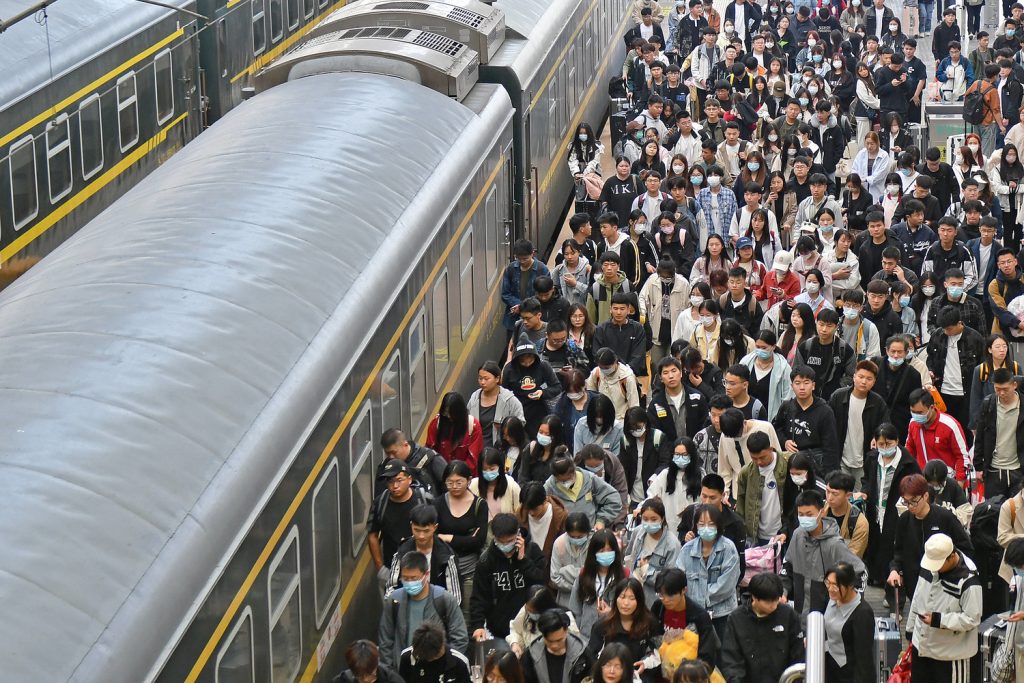
The holidays at the beginning of May have been successful for the Chinese tourism industry. According to the Ministry of Culture and Tourism, about 274 million trips were made between last Friday and this Wednesday. This is 70 percent more than last year and about one-fifth more than before the pandemic. According to official figures, the travel industry and retail sector turned over about 148 billion yuan (about 20 billion euros).
Rail travel also saw a substantial increase. The railway authority estimated the number of rail travelers at around 120 million, a fifth more than in the pre-pandemic May holidays.
The numbers turned out better than many analysts had expected. The fact that the Chinese are as keen to travel again as if Covid had never existed is also an important insight for the international tourism industry. Especially during the “Golden Week” around the National Day on October 1, tour operators and hotel operators around the world are hoping for booming Chinese tourist travel.
This wish could come true because the May holidays have shown that the trend is also slowly picking up again for international travel. During the Spring Festival, shortly after the end of zero-Covid, the Chinese still hardly had any other choice than to travel domestically. Flights were hardly available, and visas were hard to get.
However, the situation is slowly improving. According to the Chinese booking platform Qunar.com, the number of overseas travelers at least recovered to around 45 percent of May 2019 holiday bookings. This year, Thailand, Malaysia, Singapore and Hong Kong were particularly popular among Chinese tourists.
The situation should ease further by October. Airlines will offer more flights, and visa offices will have dealt with the backlog of applications. By then, Europe should also benefit more from Chinese tourists. The past few days have shown that Chinese tourists have not forgotten how to spend money on holiday.
Major retailers reported a surge in sales of around 15 percent over the holidays compared to the previous year, Bloomberg reported. And the box office was buzzing. By late Tuesday morning, movie tickets worth 1.1 billion yuan (about 144 million euros) had been sold nationwide.
Even the crowds gathered at China’s tourist hotspots over the past few days have reached at least their pre-pandemic level – long lines formed at the main sights in the capital Beijing and the ancient city of Xi’an. Dali, a historic town in the southern Chinese province of Yunnan, the West Lake in Hangzhou and the beaches of the eastern Chinese city of Qingdao also attracted many tourists.
May 9, 2023; 6:30 p.m. CET (May 10, 12:30 a.m. CST)
Fairbank Center for Chinese Studies, Workshop: Parks in Modern China, Xinjiang, Water Conservancy Projects, and More More
May 9, 2023; 4 p.m. CET (10 p.m. CST)
Dezan Shira & Associates, Webinar: WSJ Risk and Compliance Forum – Working in China Session More
May 11, 2023; 10 a.m. CET (4 p.m. CST)
EU SME Centre, Hybrid Workshop: Cross-Border E-Commerce: The Chinese Market Just a Click Away? More
May 11, 2023; 10 a.m. CET (4 p.m. CST)
Dezan Shira & Associates, Webinar: Investing and Doing Business in Hong Kong 2023: Opportunities in the Post-Covid Chapter More
May 11, 2023; 10:30 a.m. CET (4:30 p.m. CST)
German Centre Beijing / LBBW, Webinar: Opportunities for Innovative German Solutions in China’s Fast-growing MedTech Market More
May 11, 2023; 11 a.m. CET (5 p.m. CST)
Kiel Institute for the World Economy, Global China Conversations: Geopolitics and Raw Materials: How Can Europe Balance China’s Centrality? More
May 11, 2023; 12:30 p.m. CET (6:30 p.m. CST)
CEIBS Zurich / China Network Baden-Württemberg, Webinar: Growing by Localization: A Case in China’s Automation and Robotics Industry More
A government source claims that Rome is not interested in extending the Belt & Road agreement. More time is needed to decide on the matter, a high-ranking government official told Reuters. The matter was highly sensitive, they said. But no formal decision will be made before the G7 meeting in Japan at the end of the month, according to the government source.
Italy’s main eurozone trading partners, France and Germany, exported significantly more to China last year even though they are not part of the BRI. The government official said Rome would use the overly slow expansion of economic ties as an argument for not renewing the deal.
Prime Minister Giorgia Meloni’s office declined to comment. In 2019, Italy became the first and so far only G7 nation to formally join the BRI. However, the cooperation agreement, a Memorandum of Understanding (MoU), expires in March 2024. Meloni’s government must decide soon whether to renew the agreement. The far-right populist had met with Chinese President Xi Jinping in Bali last November and accepted an invitation to visit China. However, the date for this has not yet been set. ari
China expresses anger over a possible NATO liaison office in Japan. Following a Japanese newspaper report on Wednesday about such plans, the Chinese Foreign Ministry on Thursday accused the North Atlantic alliance of interfering in regional affairs and attempting to destroy peace and stability in the region.
Nikkei Asia reported that NATO was planning to open its first Asian liaison office in the Japanese capital Tokyo next year. The aim is to facilitate talks with other partners such as South Korea, Australia and New Zealand. The background is the geopolitical tensions between NATO members on the one hand and China and Russia on the other. Nikkei Asia cited unnamed representatives of Japan and NATO.
NATO merely stated that the alliance maintains good relations with Japan and runs several liaison offices around the globe. ari
Attempting to return the production of industrial goods from China to Germany and friendly countries would be costly and place a heavy burden on the economy in many regions. That is the conclusion of a new study by economist Gabriel Felbermayr of the Austrian Institute of Economic Research. Felbermayr, who headed the Kiel Institute for the World Economy (IfW) until 2021, conducted it on behalf of the Munich-based Foundation for Family Businesses.
The report not only focuses on China but on the decoupling of large economies outside the EU in general. Using a complex model, it attempts to calculate what effects the EU’s renunciation of trade with the countries in question would have on Germany’s real income:
If the EU were to theoretically decouple from all parts of the world (including Japan and Switzerland) simultaneously, the real income of German citizens would drop by a combined 20 percent in the short term. The Foundation for Family Businesses warns policymakers not to treat such ideas lightly.
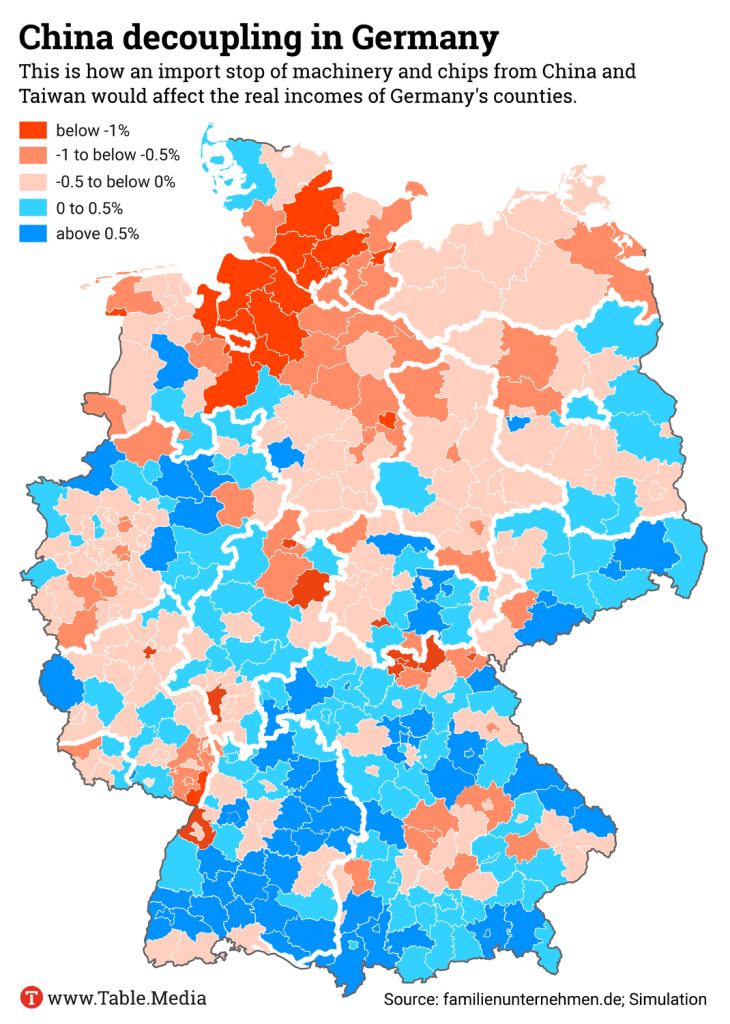
The study focuses on individual counties. A breakdown of trade with China would hit northwest Germany in particular. The effect is particularly noticeable in the electronics and machinery sector, including microchips; however, the study data combines imports from China and Taiwan. In contrast, southern Germany also has regions that would benefit. Here, on the other hand, a termination of trade with Switzerland would cause significant damage. fin
The Ministry of Agriculture and Rural Affairs officially recognized the safety of a genetically modified soybean plant from Shandong Shunfeng Biotechnology. This is the first time China has approved a gene-edited crop.
Unlike genetically modified plants, no foreign genes from other plants are introduced into genome-edited plants. Instead, the plant’s individual genetic information is altered to make it more resistant, for example, or to give it improved properties. In the case of the soybean, two genes were edited to increase the amount of healthy oleic acid. However, further approval steps are needed before the Ministry finally clears the plant for cultivation. Shunfeng is conducting parallel research on 20 other genome-edited plants, including high-yielding rice, wheat, and corn varieties.
With a population of 1.4 billion and a relatively small agricultural area, food safety is a politically sensitive issue in China. Climate events such as extreme heat waves, droughts, and the war in the important wheat-growing country Ukraine have recently increased the pressure. Genome adaptations are considered a simple and cost-effective way to increase crop yields and resilience. jul
China was a recurring theme during the presentation of the Volkswagen Group’s quarterly figures. The background is the company’s poor performance on the world’s largest car market. The board’s message is now: The gap can be closed again. The company said it failed to get off the starting blocks fast enough with EVs in the world’s largest passenger car market, but is now catching up. “We have strong products and strong brands,” said CFO Arno Antlitz.
VW is currently investing one billion euros in a new development center for connected vehicles. The group will increase its focus on earning power in the People’s Republic rather than on volume. “China will remain a very important market, and it will also remain a profitable market,” Antlitz emphasized. fin/rtr

In more than a quarter of a century of globalization, China, as a new global economic power, has crafted an elaborate system for its foreign relations. From 1994 to 2014, Beijing formed “special” partnerships with 58 countries. It classified the nature of its relations with a dozen terms of its own invention, such as “cooperative,” “comprehensive,” “all-round,” “strategic,” or “all-weather.” Even Chinese diplomats can no longer make sense of it all. Since Xi Jinping’s rise to power, the number of strictly bilateral partnerships has doubled. He made them a top priority and often presented them as a “model” for others. Since he proclaimed his “new era of socialism,” Xi has had topical key phrases of his agenda written into new or upgraded partnership agreements – a special move to influence the world.
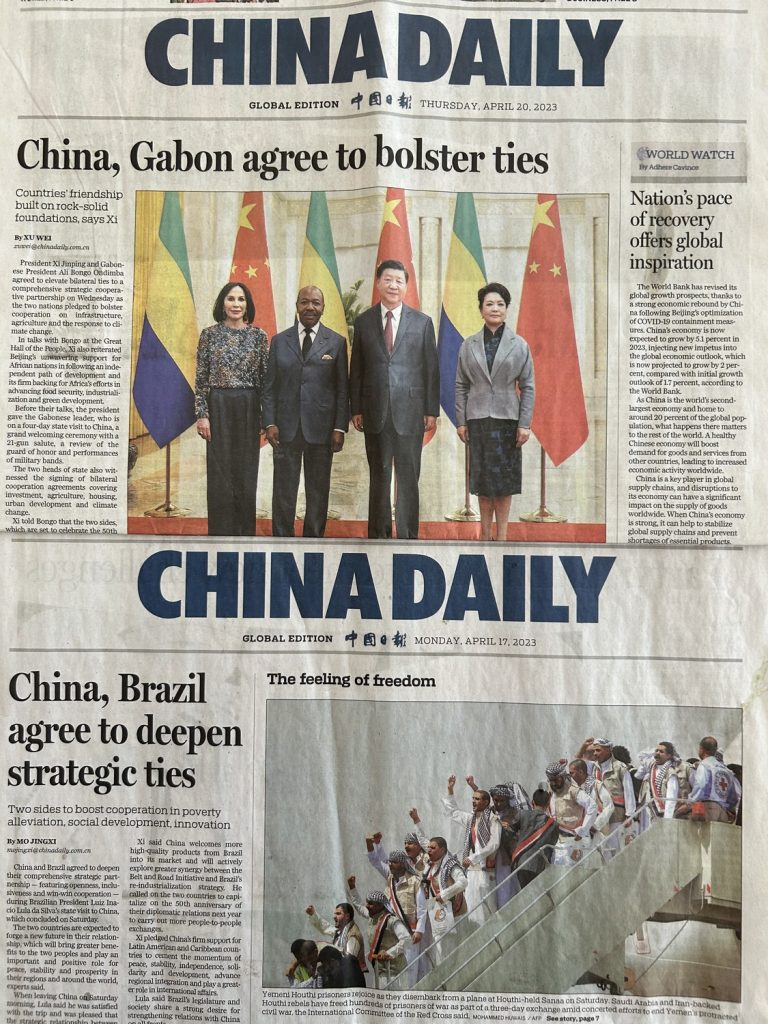
In early November 1975, a small group of German students in Beijing received a special invitation. As scholarship holders of the Bonn Academic Exchange Service (DAAD), we had only been in the country for a short time when Ambassador Rolf Pauls called us on the occasion of Helmut Schmidt’s first official visit. The chancellor had just been received by the mentally still fit but physically frail Mao Zedong. Barely a year later, the Great Chairman died.
Pauls talked about how intensively Marxist Mao had spoken with Schmidt about great German thinkers who had influenced them both. In the end, Mao confessed that his “water was no longer enough” to change the world. Quick-witted, Schmidt flattered Mao by saying, “constant dropping wears away a stone.” In his memoirs, he praised himself for philosophizing at eye level with the dictator.
Schmidt was less fond of Mao’s views on the global situation. As a defender of Willy Brandt’s Ostpolitik, he remained careful in 1975 not to let Beijing turn him against the Soviet Union. Mao and Vice Premier Deng Xiaoping tried to pitch their “Three Worlds Theory” to Schmidt. He dismissively called it a “sandwich strategy.”
Mao only devised the new theory in February 1974 – two years after Nixon’s Beijing visit. He divided the world into three power blocs. The “First World” included the USA and the Soviet Union. Beijing saw the US as “imperialist” but considered Moscow the more dangerous “social-imperialist” hegemon.
Mao’s concept was simple: Two superpowers struggling for global dominance gripped the industrialized countries of the “Second World” like vices, including Japan, Canada and Europe, some of which they were allies with, but which they also tyrannized. This connected the Second World with the oppressed “Third World” of the developing countries from Africa to Latin America, including China.
Mao and Deng, who publicized Mao’s theory before the UN in April 1974, counted Germany as part of the Second World. It could potentially be enlisted to support the Third World.
The People’s Republic proclaimed itself their “natural ally” and advocate. For geopolitical reasons and economic advantages, it continues to claim to be the “world’s largest developing country,” even though China has long since become a trade and economic giant.
That was all that remained of Mao’s Three Worlds Theory. From 1994 onward, China, as an emerging superpower, began to reorganize its foreign relations bilaterally. Bureaucrats hatched twelve definitions by 2014 of how China calls and classifies its new partnerships.
In 2014, Beijing announced a first stocktaking. The Beijing Times (京华时报) published a list of the 58 states along with the designations of their respective partnerships with China. “Friendly-cooperative” (友好合作伙伴) was the rating for Hungary. Cautiously, Beijing and Washington agreed on the formula: “New Type of Great Power Relations” (构建新型大国关系). China and Russia approached each other with “comprehensive strategic-coordinated partner relations” (全面战略协作伙伴).
Germany climbed up the relationship hit list in 2014 with “all-round developed strategic partner relations” (全方位战略伙伴). Berlin owed this to the diversity of its economic cooperation and technology transfers, its joint government consultations and the “Angela Merkel bonus,” who visited Beijing once a year in her capacity as chancellor. The only country above Germany was Pakistan, with which China agreed to “all-weather strategic partnership of cooperation” (全天候战略合作伙伴) for historical reasons and because of its role in the Silk Road.
The People’s Republic also courted Ukraine until 2014, as one of 18 states with which it maintained a “strategic partnership” (战略伙伴). But that did not change the fact that Beijing sided with Moscow after Russia’s war of aggression. After all, Xi Jinping mentioned their “strategic partnership” on April 26, 2023, when he spoke with President Volodymyr Zelenskiy on the phone for the first time, 400 days after Putin’s invasion. China’s media was allowed to report that.
Beijing’s run at the time to forge new partnerships was intended to provide it with more flexibility to more aggressively represent its claims and interests as a superpower to the outside world. Xi Jinping urged this. Immediately after assuming power, he called on the nation to fulfill its dream of national rejuvenation and, in order to do so, to reverse the old world order.
Cartoonists sum up how far he has come in the meantime. In late March, the Economist ran a cover of China as a red planet, with satellites orbiting around it, the largest of which was Russia. The headline reads: “The world according to Xi.”
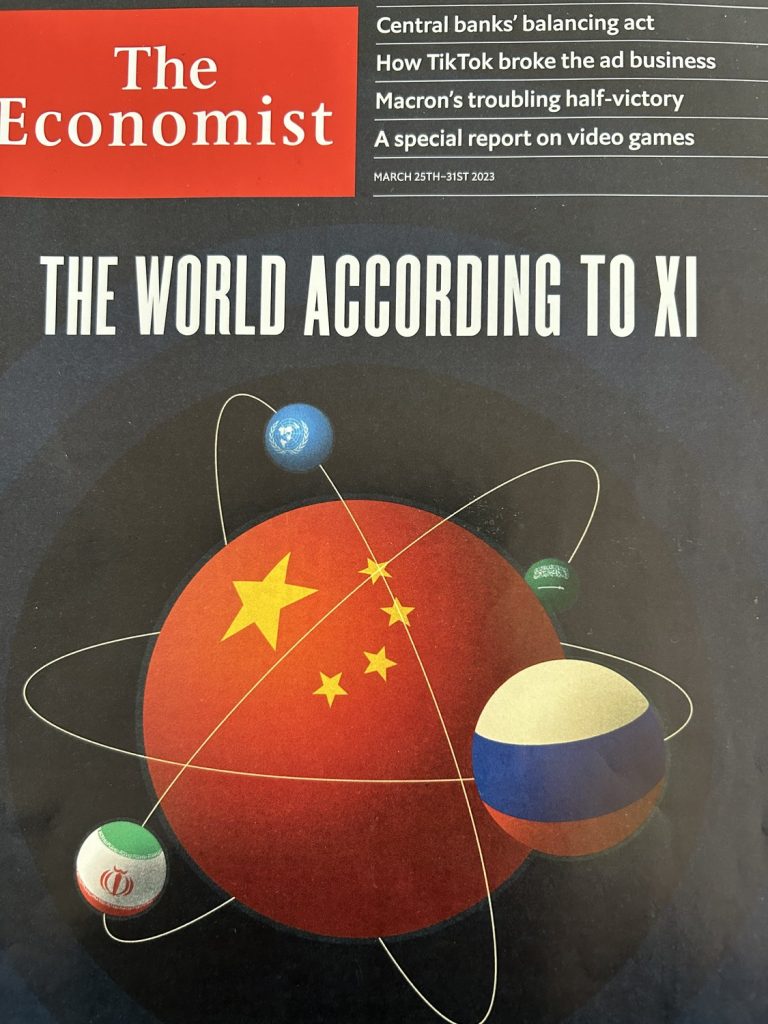
Earlier, Literary Review magazine depicted Xi and Putin dividing up the world. The Russian czar jabs Ukraine; China’s supreme comrade sets his sights on Taiwan. The drawing is based on the Beijing meeting of the two on February 4, 2022, when Xi and Putin vowed to each other “friendship without limits” to change the global situation in their favor.
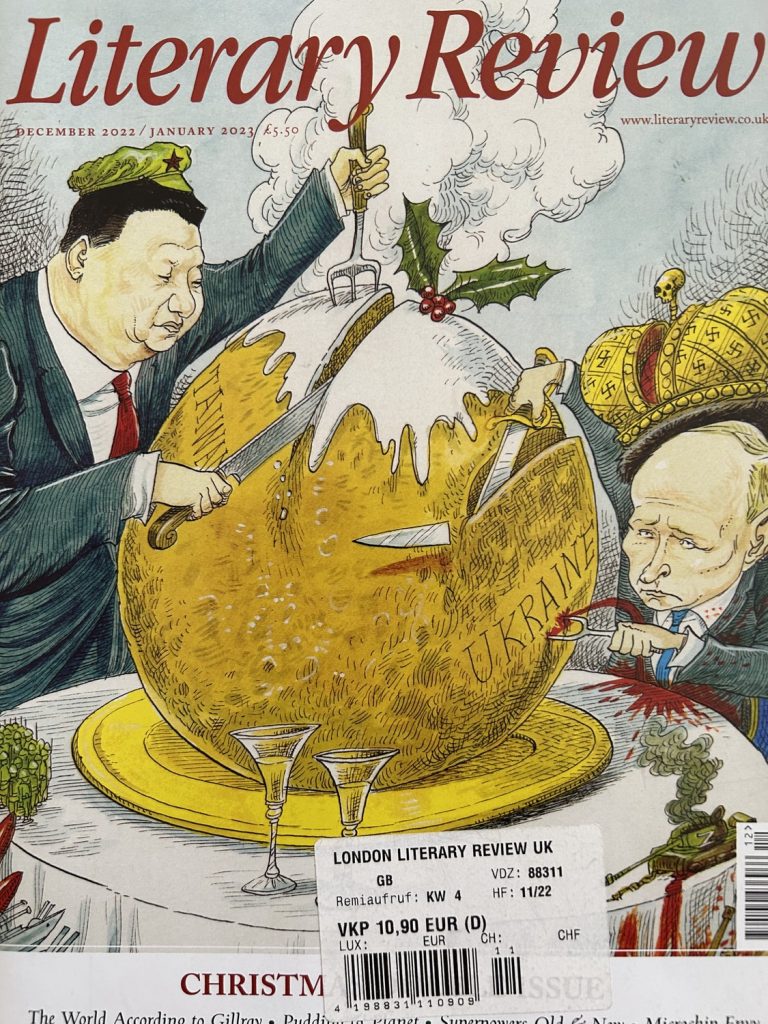
It also alludes to a world-famous cartoon that France’s illustrated magazine Le Petit Journal used on January 16, 1898, to denounce the colonial dismemberment of China by imperialist powers. Beijing’s cultural magazine China’s Heritage (中华遗产) reprinted it, writing, “The Weak Country and Its Foreign Policy Battle.” The issue appeared in October 2012, when Xi Jinping had just been elected party leader in Beijing.
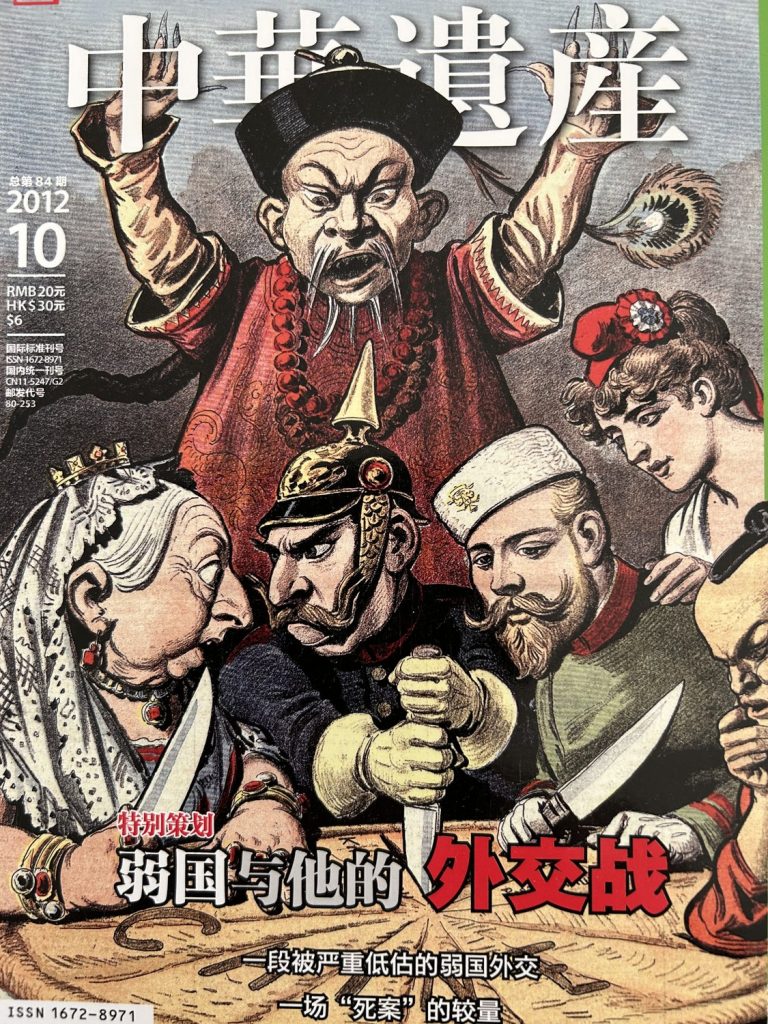
The number of countries with which China has signed bilateral cooperation agreements has nearly doubled under his wing since 2014. After the standstill due to the Covid pandemic, Xi launched a charm offensive last November in an effort to sign a steady stream of new partnerships.
There is one noticeable difference in the agreements China has since signed with countries ranging from Russia to Belarus, Singapore to Malaysia, or Gabon to Cambodia. More and more buzzwords from Xi’s latest political agenda after the 20th Party Congress appear in the agreements, such as “great changes unseen in a century” (和世界百年未有之大变局) or Xi’s “new era” (新时代).
These are key expressions that show the party leader’s intention to also personally direct China’s foreign relations. After a visit to Moscow in March, Xi agreed with Putin on “deepening the Comprehensive Strategic Partnership of Coordination for the New Era (深化新时代全面战略协作伙伴关系). With Belarus, he forged what he called an “all-weather” partnership “for the new era.” (新时代进一步发展两国全天候全面战略伙伴关系) Singapore’s Prime Minister Lee Hsien Loong agreed in April to the formula of “All Round High Quality Future Oriented Partnership.” (全方位高质量的前瞻性伙伴关系).
Xi’s new global theories on the China Development Initiative (CDI), Global Security Initiative (GSI) and Global Civilization Initiative (GCI), which foreign countries should do their best to adopt, are also part of these agreements.
But instead of successes, Beijing has had to accept more and more setbacks in its global relations owed to its expansive and aggressive foreign policy. Its relations with the Philippines, South Korea, Japan or Vietnam cooled dramatically, as well as with the Balkan States, Eastern and Western Europe, the United States, Canada and Australia.
It is no wonder, analysts for Singapore’s ISEAS Research Institute (formerly the Institute of South East Asian Studies) commented in late April. Beijing promises “model” partnerships, “win-win” relationships, or “respect for each other’s interests.” It fails because, first and foremost, it does not adhere to them itself: “Despite its rhetoric that all states are equal, China behaves like any other big power, either resorting to coercion or interpreting international laws and norms in ways that suit its interests.” A prime example, they said, is the People’s Republic’s claim to the South China Sea and its “increased presence and harassment of other claimant countries’ vessels or nationals.”
Kevin Binder is the new CFO of Daimler Greater China. He is based in Beijing. He succeeds Olaf Schick, who left the company to join Continental.
Is something changing in your organization? Let us know at heads@table.media!
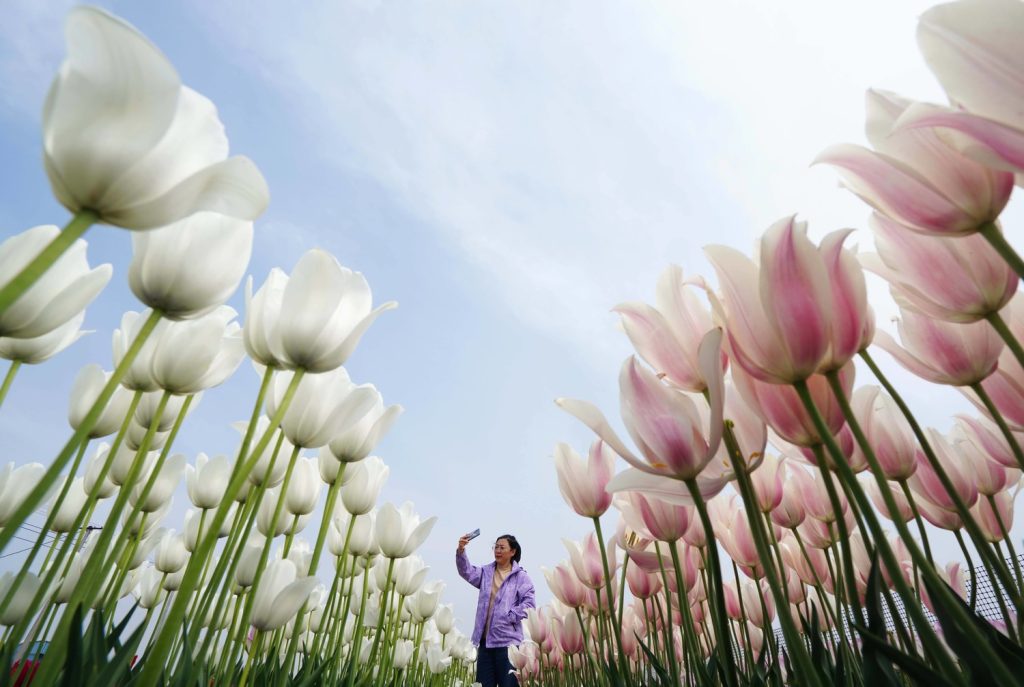
No flower symbolizes spring as much as the tulip. Most people first think of the Netherlands when they think of this colorful cut flower. However, the tulip originally comes from mountainous regions in Central Asia. It is a lily plant and first reached China before conquering Europe’s gardens and vases. This tourist in the town of Donghuangtuo, Hebei Province, enjoys the sight of the Chinese variants.
The UN Human Rights Council in Geneva should actually be a huge fan of sanctions, or so it would seem. How else is the international community supposed to exert pressure on countries that violate the rights of their citizens?
But this is not the case. A line has prevailed in the Geneva body that rejects economic sanctions if they are not borne by the entire United Nations. These are not legal, it argued.
However, a look at the majority ratios dispels the apparent contradiction. The Asian, African and Latin American states voted against the West in the Council at China’s behest. They do not want to be patronized by US-led coalitions, analyzes Frank Sieren.
Chinese tourists are expected to return to Europe for the fall travel season. So far, they have not been able to live out their desire to travel despite the extensive opening up because, among other things, there has been a lack of affordable flights. But the travel industry already foresees the recovery. A first sign was the record domestic tourism revenues during the May holidays, writes Joern Petring.
In 2014, Germany was still at the top of the Chinese pecking order of international partnerships. In Chinese terminology, there was an “all-around developed strategic partner relationship” between the two countries. Nowadays, Germany has to share the attention of its big partner with many more countries, writes Johnny Erling. Xi Jinping has woven a web of new relationships, constantly devising new partnership tiers.


The UN Human Rights Council calls in a resolution for ending unilateral sanctions that are, among other things, “not in accordance with international law, international humanitarian law, [and] the Charter of the United Nations. The text urges all nations to stop “stop adopting, maintaining, implementing or complying” with such unilateral economic sanctions. 33 states voted in favor, including China. 13 voted against, with Mexico abstaining.
This was a setback in the United Nations for the US-led West. All Asian, African and Latin American states represented in the Council voted in favor of the resolution. These “unilateral coercive measures” violate the UN Charter and “the norms and principles governing peaceful relations among States,” the text says.
The document calls for ending such sanctions. It condemns them as “coercive measures” used by “some states” to “threaten the sovereignty of States,” particularly “against least developed and developing countries, with a view to preventing these countries from exercising their right to decide, of their own free will, their own political, economic and social systems.” UN resolutions from the Human Rights Council, like in many other organizations of states and parliaments, are non-binding for member states or executive institutions.
China is one of the countries that have been advocating and pushing this agenda for years. Almost ten years ago, when the current Foreign Minister Qin Gang was still a spokesperson for the Foreign Ministry, he already opposed sanctions on behalf of the Chinese government. For a long time, this position lacked majority support. In spring, however, the “Non-Aligned Movement” led by India, China and Brazil with around 120 members, was able to agree on a common line.
This can be seen as a diplomatic success for Beijing, but also for Delhi. But the resolution was submitted by Azerbaijan on behalf of the “non-aligned” states. Azerbaijan, located between the Caspian Sea and the Caucasus, which stretches between Asia and Europe, is a key country in the China-Central Asia-West Asia Economic Corridor (CCAWEC). It connects the People’s Republic to Europe, bypassing Russia. Baku and its regime are not necessarily considered avid supporters of human rights. Although Azerbaijan has complicated, chequered relations with Russia, it has not joined the sanctions against it.
The three Asian countries that support Western sanctions against Russia – Japan, Singapore, and, to a lesser extent, South Korea – also voted for the abolition of unilateral sanctions. It is important to note that the resolution does not fundamentally oppose sanctions but only punitive measures that have not found a majority in the UN. The UN has been able to agree on sanctions for a dozen countries, including Iran, Sudan and North Korea.
The US, the NATO states along with Georgia, Montenegro, and Ukraine rejected the UN resolution. The voting results show the growing rift between the established West and the emerging countries. The BRICS countries represent more people and more global economic power than the G7.
The US representative to the UN Human Rights Council, Michèle Taylor, said the resolution text inappropriately questions the ability of states to determine their economic relations and protect legitimate national interests. German Foreign Minister Annalena Baerbock, who spoke at the beginning of the Human Rights Council session in Geneva, has not yet commented on the resolution text.
During her visit to Beijing, Baerbock reminded her counterpart Qin Gang of the importance of the Council: “We would welcome cooperation with the UN Human Rights Council to implement its recommendations, as we are all obliged to do as members of the United Nations.” Baerbock made these remarks in connection with the UN Human Rights Council’s findings on Xinjiang. If this is Baerbock’s rationale, she should now also feel obliged to implement the content of the adopted sanctions resolution.

The holidays at the beginning of May have been successful for the Chinese tourism industry. According to the Ministry of Culture and Tourism, about 274 million trips were made between last Friday and this Wednesday. This is 70 percent more than last year and about one-fifth more than before the pandemic. According to official figures, the travel industry and retail sector turned over about 148 billion yuan (about 20 billion euros).
Rail travel also saw a substantial increase. The railway authority estimated the number of rail travelers at around 120 million, a fifth more than in the pre-pandemic May holidays.
The numbers turned out better than many analysts had expected. The fact that the Chinese are as keen to travel again as if Covid had never existed is also an important insight for the international tourism industry. Especially during the “Golden Week” around the National Day on October 1, tour operators and hotel operators around the world are hoping for booming Chinese tourist travel.
This wish could come true because the May holidays have shown that the trend is also slowly picking up again for international travel. During the Spring Festival, shortly after the end of zero-Covid, the Chinese still hardly had any other choice than to travel domestically. Flights were hardly available, and visas were hard to get.
However, the situation is slowly improving. According to the Chinese booking platform Qunar.com, the number of overseas travelers at least recovered to around 45 percent of May 2019 holiday bookings. This year, Thailand, Malaysia, Singapore and Hong Kong were particularly popular among Chinese tourists.
The situation should ease further by October. Airlines will offer more flights, and visa offices will have dealt with the backlog of applications. By then, Europe should also benefit more from Chinese tourists. The past few days have shown that Chinese tourists have not forgotten how to spend money on holiday.
Major retailers reported a surge in sales of around 15 percent over the holidays compared to the previous year, Bloomberg reported. And the box office was buzzing. By late Tuesday morning, movie tickets worth 1.1 billion yuan (about 144 million euros) had been sold nationwide.
Even the crowds gathered at China’s tourist hotspots over the past few days have reached at least their pre-pandemic level – long lines formed at the main sights in the capital Beijing and the ancient city of Xi’an. Dali, a historic town in the southern Chinese province of Yunnan, the West Lake in Hangzhou and the beaches of the eastern Chinese city of Qingdao also attracted many tourists.
May 9, 2023; 6:30 p.m. CET (May 10, 12:30 a.m. CST)
Fairbank Center for Chinese Studies, Workshop: Parks in Modern China, Xinjiang, Water Conservancy Projects, and More More
May 9, 2023; 4 p.m. CET (10 p.m. CST)
Dezan Shira & Associates, Webinar: WSJ Risk and Compliance Forum – Working in China Session More
May 11, 2023; 10 a.m. CET (4 p.m. CST)
EU SME Centre, Hybrid Workshop: Cross-Border E-Commerce: The Chinese Market Just a Click Away? More
May 11, 2023; 10 a.m. CET (4 p.m. CST)
Dezan Shira & Associates, Webinar: Investing and Doing Business in Hong Kong 2023: Opportunities in the Post-Covid Chapter More
May 11, 2023; 10:30 a.m. CET (4:30 p.m. CST)
German Centre Beijing / LBBW, Webinar: Opportunities for Innovative German Solutions in China’s Fast-growing MedTech Market More
May 11, 2023; 11 a.m. CET (5 p.m. CST)
Kiel Institute for the World Economy, Global China Conversations: Geopolitics and Raw Materials: How Can Europe Balance China’s Centrality? More
May 11, 2023; 12:30 p.m. CET (6:30 p.m. CST)
CEIBS Zurich / China Network Baden-Württemberg, Webinar: Growing by Localization: A Case in China’s Automation and Robotics Industry More
A government source claims that Rome is not interested in extending the Belt & Road agreement. More time is needed to decide on the matter, a high-ranking government official told Reuters. The matter was highly sensitive, they said. But no formal decision will be made before the G7 meeting in Japan at the end of the month, according to the government source.
Italy’s main eurozone trading partners, France and Germany, exported significantly more to China last year even though they are not part of the BRI. The government official said Rome would use the overly slow expansion of economic ties as an argument for not renewing the deal.
Prime Minister Giorgia Meloni’s office declined to comment. In 2019, Italy became the first and so far only G7 nation to formally join the BRI. However, the cooperation agreement, a Memorandum of Understanding (MoU), expires in March 2024. Meloni’s government must decide soon whether to renew the agreement. The far-right populist had met with Chinese President Xi Jinping in Bali last November and accepted an invitation to visit China. However, the date for this has not yet been set. ari
China expresses anger over a possible NATO liaison office in Japan. Following a Japanese newspaper report on Wednesday about such plans, the Chinese Foreign Ministry on Thursday accused the North Atlantic alliance of interfering in regional affairs and attempting to destroy peace and stability in the region.
Nikkei Asia reported that NATO was planning to open its first Asian liaison office in the Japanese capital Tokyo next year. The aim is to facilitate talks with other partners such as South Korea, Australia and New Zealand. The background is the geopolitical tensions between NATO members on the one hand and China and Russia on the other. Nikkei Asia cited unnamed representatives of Japan and NATO.
NATO merely stated that the alliance maintains good relations with Japan and runs several liaison offices around the globe. ari
Attempting to return the production of industrial goods from China to Germany and friendly countries would be costly and place a heavy burden on the economy in many regions. That is the conclusion of a new study by economist Gabriel Felbermayr of the Austrian Institute of Economic Research. Felbermayr, who headed the Kiel Institute for the World Economy (IfW) until 2021, conducted it on behalf of the Munich-based Foundation for Family Businesses.
The report not only focuses on China but on the decoupling of large economies outside the EU in general. Using a complex model, it attempts to calculate what effects the EU’s renunciation of trade with the countries in question would have on Germany’s real income:
If the EU were to theoretically decouple from all parts of the world (including Japan and Switzerland) simultaneously, the real income of German citizens would drop by a combined 20 percent in the short term. The Foundation for Family Businesses warns policymakers not to treat such ideas lightly.

The study focuses on individual counties. A breakdown of trade with China would hit northwest Germany in particular. The effect is particularly noticeable in the electronics and machinery sector, including microchips; however, the study data combines imports from China and Taiwan. In contrast, southern Germany also has regions that would benefit. Here, on the other hand, a termination of trade with Switzerland would cause significant damage. fin
The Ministry of Agriculture and Rural Affairs officially recognized the safety of a genetically modified soybean plant from Shandong Shunfeng Biotechnology. This is the first time China has approved a gene-edited crop.
Unlike genetically modified plants, no foreign genes from other plants are introduced into genome-edited plants. Instead, the plant’s individual genetic information is altered to make it more resistant, for example, or to give it improved properties. In the case of the soybean, two genes were edited to increase the amount of healthy oleic acid. However, further approval steps are needed before the Ministry finally clears the plant for cultivation. Shunfeng is conducting parallel research on 20 other genome-edited plants, including high-yielding rice, wheat, and corn varieties.
With a population of 1.4 billion and a relatively small agricultural area, food safety is a politically sensitive issue in China. Climate events such as extreme heat waves, droughts, and the war in the important wheat-growing country Ukraine have recently increased the pressure. Genome adaptations are considered a simple and cost-effective way to increase crop yields and resilience. jul
China was a recurring theme during the presentation of the Volkswagen Group’s quarterly figures. The background is the company’s poor performance on the world’s largest car market. The board’s message is now: The gap can be closed again. The company said it failed to get off the starting blocks fast enough with EVs in the world’s largest passenger car market, but is now catching up. “We have strong products and strong brands,” said CFO Arno Antlitz.
VW is currently investing one billion euros in a new development center for connected vehicles. The group will increase its focus on earning power in the People’s Republic rather than on volume. “China will remain a very important market, and it will also remain a profitable market,” Antlitz emphasized. fin/rtr

In more than a quarter of a century of globalization, China, as a new global economic power, has crafted an elaborate system for its foreign relations. From 1994 to 2014, Beijing formed “special” partnerships with 58 countries. It classified the nature of its relations with a dozen terms of its own invention, such as “cooperative,” “comprehensive,” “all-round,” “strategic,” or “all-weather.” Even Chinese diplomats can no longer make sense of it all. Since Xi Jinping’s rise to power, the number of strictly bilateral partnerships has doubled. He made them a top priority and often presented them as a “model” for others. Since he proclaimed his “new era of socialism,” Xi has had topical key phrases of his agenda written into new or upgraded partnership agreements – a special move to influence the world.

In early November 1975, a small group of German students in Beijing received a special invitation. As scholarship holders of the Bonn Academic Exchange Service (DAAD), we had only been in the country for a short time when Ambassador Rolf Pauls called us on the occasion of Helmut Schmidt’s first official visit. The chancellor had just been received by the mentally still fit but physically frail Mao Zedong. Barely a year later, the Great Chairman died.
Pauls talked about how intensively Marxist Mao had spoken with Schmidt about great German thinkers who had influenced them both. In the end, Mao confessed that his “water was no longer enough” to change the world. Quick-witted, Schmidt flattered Mao by saying, “constant dropping wears away a stone.” In his memoirs, he praised himself for philosophizing at eye level with the dictator.
Schmidt was less fond of Mao’s views on the global situation. As a defender of Willy Brandt’s Ostpolitik, he remained careful in 1975 not to let Beijing turn him against the Soviet Union. Mao and Vice Premier Deng Xiaoping tried to pitch their “Three Worlds Theory” to Schmidt. He dismissively called it a “sandwich strategy.”
Mao only devised the new theory in February 1974 – two years after Nixon’s Beijing visit. He divided the world into three power blocs. The “First World” included the USA and the Soviet Union. Beijing saw the US as “imperialist” but considered Moscow the more dangerous “social-imperialist” hegemon.
Mao’s concept was simple: Two superpowers struggling for global dominance gripped the industrialized countries of the “Second World” like vices, including Japan, Canada and Europe, some of which they were allies with, but which they also tyrannized. This connected the Second World with the oppressed “Third World” of the developing countries from Africa to Latin America, including China.
Mao and Deng, who publicized Mao’s theory before the UN in April 1974, counted Germany as part of the Second World. It could potentially be enlisted to support the Third World.
The People’s Republic proclaimed itself their “natural ally” and advocate. For geopolitical reasons and economic advantages, it continues to claim to be the “world’s largest developing country,” even though China has long since become a trade and economic giant.
That was all that remained of Mao’s Three Worlds Theory. From 1994 onward, China, as an emerging superpower, began to reorganize its foreign relations bilaterally. Bureaucrats hatched twelve definitions by 2014 of how China calls and classifies its new partnerships.
In 2014, Beijing announced a first stocktaking. The Beijing Times (京华时报) published a list of the 58 states along with the designations of their respective partnerships with China. “Friendly-cooperative” (友好合作伙伴) was the rating for Hungary. Cautiously, Beijing and Washington agreed on the formula: “New Type of Great Power Relations” (构建新型大国关系). China and Russia approached each other with “comprehensive strategic-coordinated partner relations” (全面战略协作伙伴).
Germany climbed up the relationship hit list in 2014 with “all-round developed strategic partner relations” (全方位战略伙伴). Berlin owed this to the diversity of its economic cooperation and technology transfers, its joint government consultations and the “Angela Merkel bonus,” who visited Beijing once a year in her capacity as chancellor. The only country above Germany was Pakistan, with which China agreed to “all-weather strategic partnership of cooperation” (全天候战略合作伙伴) for historical reasons and because of its role in the Silk Road.
The People’s Republic also courted Ukraine until 2014, as one of 18 states with which it maintained a “strategic partnership” (战略伙伴). But that did not change the fact that Beijing sided with Moscow after Russia’s war of aggression. After all, Xi Jinping mentioned their “strategic partnership” on April 26, 2023, when he spoke with President Volodymyr Zelenskiy on the phone for the first time, 400 days after Putin’s invasion. China’s media was allowed to report that.
Beijing’s run at the time to forge new partnerships was intended to provide it with more flexibility to more aggressively represent its claims and interests as a superpower to the outside world. Xi Jinping urged this. Immediately after assuming power, he called on the nation to fulfill its dream of national rejuvenation and, in order to do so, to reverse the old world order.
Cartoonists sum up how far he has come in the meantime. In late March, the Economist ran a cover of China as a red planet, with satellites orbiting around it, the largest of which was Russia. The headline reads: “The world according to Xi.”

Earlier, Literary Review magazine depicted Xi and Putin dividing up the world. The Russian czar jabs Ukraine; China’s supreme comrade sets his sights on Taiwan. The drawing is based on the Beijing meeting of the two on February 4, 2022, when Xi and Putin vowed to each other “friendship without limits” to change the global situation in their favor.

It also alludes to a world-famous cartoon that France’s illustrated magazine Le Petit Journal used on January 16, 1898, to denounce the colonial dismemberment of China by imperialist powers. Beijing’s cultural magazine China’s Heritage (中华遗产) reprinted it, writing, “The Weak Country and Its Foreign Policy Battle.” The issue appeared in October 2012, when Xi Jinping had just been elected party leader in Beijing.

The number of countries with which China has signed bilateral cooperation agreements has nearly doubled under his wing since 2014. After the standstill due to the Covid pandemic, Xi launched a charm offensive last November in an effort to sign a steady stream of new partnerships.
There is one noticeable difference in the agreements China has since signed with countries ranging from Russia to Belarus, Singapore to Malaysia, or Gabon to Cambodia. More and more buzzwords from Xi’s latest political agenda after the 20th Party Congress appear in the agreements, such as “great changes unseen in a century” (和世界百年未有之大变局) or Xi’s “new era” (新时代).
These are key expressions that show the party leader’s intention to also personally direct China’s foreign relations. After a visit to Moscow in March, Xi agreed with Putin on “deepening the Comprehensive Strategic Partnership of Coordination for the New Era (深化新时代全面战略协作伙伴关系). With Belarus, he forged what he called an “all-weather” partnership “for the new era.” (新时代进一步发展两国全天候全面战略伙伴关系) Singapore’s Prime Minister Lee Hsien Loong agreed in April to the formula of “All Round High Quality Future Oriented Partnership.” (全方位高质量的前瞻性伙伴关系).
Xi’s new global theories on the China Development Initiative (CDI), Global Security Initiative (GSI) and Global Civilization Initiative (GCI), which foreign countries should do their best to adopt, are also part of these agreements.
But instead of successes, Beijing has had to accept more and more setbacks in its global relations owed to its expansive and aggressive foreign policy. Its relations with the Philippines, South Korea, Japan or Vietnam cooled dramatically, as well as with the Balkan States, Eastern and Western Europe, the United States, Canada and Australia.
It is no wonder, analysts for Singapore’s ISEAS Research Institute (formerly the Institute of South East Asian Studies) commented in late April. Beijing promises “model” partnerships, “win-win” relationships, or “respect for each other’s interests.” It fails because, first and foremost, it does not adhere to them itself: “Despite its rhetoric that all states are equal, China behaves like any other big power, either resorting to coercion or interpreting international laws and norms in ways that suit its interests.” A prime example, they said, is the People’s Republic’s claim to the South China Sea and its “increased presence and harassment of other claimant countries’ vessels or nationals.”
Kevin Binder is the new CFO of Daimler Greater China. He is based in Beijing. He succeeds Olaf Schick, who left the company to join Continental.
Is something changing in your organization? Let us know at heads@table.media!

No flower symbolizes spring as much as the tulip. Most people first think of the Netherlands when they think of this colorful cut flower. However, the tulip originally comes from mountainous regions in Central Asia. It is a lily plant and first reached China before conquering Europe’s gardens and vases. This tourist in the town of Donghuangtuo, Hebei Province, enjoys the sight of the Chinese variants.
